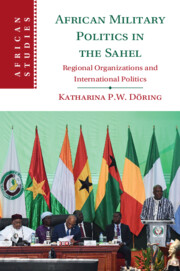Refine search
Actions for selected content:
6 results
Introduction
-
- Book:
- African Military Politics in the Sahel
- Published online:
- 02 November 2023
- Print publication:
- 16 November 2023, pp 1-33
-
- Chapter
-
- You have access
- HTML
- Export citation
1 - Spatial Semantics in African Military Politics
-
- Book:
- African Military Politics in the Sahel
- Published online:
- 02 November 2023
- Print publication:
- 16 November 2023, pp 34-61
-
- Chapter
- Export citation

African Military Politics in the Sahel
- Regional Organizations and International Politics
-
- Published online:
- 02 November 2023
- Print publication:
- 16 November 2023
2 - Globalizing the Iranian Revolution:
- from Orientations
-
-
- Book:
- Global 1979
- Published online:
- 01 July 2021
- Print publication:
- 15 July 2021, pp 36-56
-
- Chapter
- Export citation
2 - Space
-
- Book:
- Space and Fates of International Law
- Published online:
- 20 August 2020
- Print publication:
- 17 September 2020, pp 26-56
-
- Chapter
- Export citation
6 - Space and Time in Loop Quantum Gravity
- from Part II - Time in Quantum Theories of Gravity
-
-
- Book:
- Beyond Spacetime
- Published online:
- 24 April 2020
- Print publication:
- 14 May 2020, pp 117-132
-
- Chapter
- Export citation
